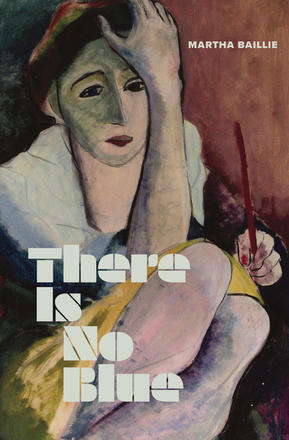
There Is No Blue
THE GLOBE AND MAIL: BOOKS TO READ IN FALL 2023
THE GLOBE AND MAIL BEST 100 BOOKS OF 2023
CBC BOOKS BEST CANADIAN NONFICTION OF 2023
Martha Baillie’s richly layered response to her mother’s passing, her father's life, and her sister’s suicide is an exploration of how the body, the rooms we inhabit, and our languages offer the psyche a home, if only for a time.
Three essays, three deaths. The first is the death of the author’s mother, a protracted disappearance, leaving space for thoughtfulness and ritual: the washing of her body, the making of a death mask. The second considers the author’s father, his remoteness, his charm, a lacuna at the centre of the family even before his death, earlier than her mother’s. And then, the shocking death of the author’s sister, a visual artist and writer living with a diagnosis of schizophrenia, who writes three reasons to die on her bedroom wall and then takes her life.
"Martha Baillie’s novels are thrillingly, joyously singular, that rare combination of sui generis and just plain generous. That There Is No Blue, her memoir, is all of those things too, is no surprise; still, she has gone somewhere extraordinary. This triptych of essays, which exquisitely unfolds the “disobedient tale” of the lives and deaths of her mother, her father, and her sister, is a meditation on the mystery and wonder of grief and art making and home and memory itself. It made me think of kintsugi, the Japanese art of repair, in which the mending is not hidden but featured and beautifully illuminated. Baillie’s variety of attention, carved out of language, is tenderness, is love." – Maud Casey, author of City of Incurable Women
"This is a stunning memoir, intense and meticulous in its observations of family life. Baillie subtly interrogates and conveys the devastating mistranslations that take place in childhood, the antagonism and porousness of siblings, and the tragedy of schizophrenia as it unfolds. I couldn’t put it down." – Dr. Lisa Appignanesi, author of Mad, Bad and Sad and Everyday Madness
"Exquisite." – Souvankham Thammavongsa, author of How to Pronounce Knife
"I am grateful for this profound meditation on family and loss.” – Charlie Kaufman, filmmaker
"This strange, unsettling memoir of outer life and inner life and their bizarre twining captures the author’s identity by way of her mother’s death, her sister’s failing battle with mental illness, and the mysterious figure of her father. It combines anguished guilt, deep tenderness, and bemused affection in highly evocative, often disturbing prose. Its brave honesty is amplified by a persistent lyricism; its undercurrent of fear is uplifted by a surprising, resilient hopefulness. It is both a plea for exoneration and an act of exoneration, an authentic meditation on the terrible difficulty of being human." – Andrew Solomon, author of The Noonday Demon
Reviews
"There is No Blue is a study in the tyranny of fragility. . . It's strangely mesmerizing, also disturbing. It's a book about memory--whose memory counts--but it's also a book about art." – Christina Patterson, The Sunday Times
"[Baillie] knows she’ll never find out why a shared childhood should have had such different outcomes; the only truth she arrives at will be variable and of her own making. Still, the 'disobedient tale' she tells is tough, tender and compelling." – Blake Morrison, The Guardian
"Baillie’s memoir in essays, There Is No Blue, emerges from a desire to collapse [the] distance between sister and sister." – Rachel Gerry, Literary Review of Canada
“Revealing, puzzling, dazzling, The Search for Heinrich Schlögel resists reduction, rewards rereading. It draws you forward as a narrative should, but ultimately unfolds in you like poetry.” – Jamie Zeppa, Literary Review of Canada on The Search for Heinrich Schlögel
“Baillie delivers a work of magical realism that captures the experience of postcolonial guilt ... and gives voice to a silenced past.” – Publishers Weekly, starred review of The Search for Heinrich Schlögel
“A poetic journey into mystery that asks hazy questions about time, culture and one’s sense of self.” – Kirkus Reviews on The Search for Heinrich Schlögel
“The beautiful descriptions of the wild outdoors in northern Canada alone make this book worth reading. Baillie is an excellent storyteller, combining adventure with deeper elements and the characters' search for self. Highly recommended.” – Library Journal on The Search for Heinrich Schlögel
“Clara, despite her volatility, is the novel's linchpin – a creative choice that speaks to Baillie's characteristic cerebral playfulness as well as her allegiance to characters held on society's margins … Baillie's empathetic portrayal of Clara shows a mind following its own kind of logic. There's a lighter tone to this novel, so it might surprise readers how much it has to say about creativity and the fractured self.” – The Globe and Mail on If Clara
“If Clara finds Baillie at the top of her game with this complex, deftly layered new novel … a richly rewarding read to sink into for a solitary afternoon.” – The Toronto Star on If Clara